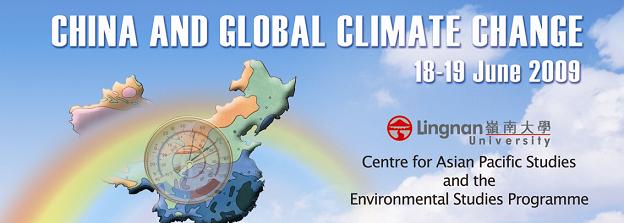
Event Title
Conference on China and Global Climate Change : Reconciling International Fairness and Protection of the Atmospheric Commons
Location
AM310, Lingnan University
Start Date
19-6-2009 11:00 AM
End Date
19-6-2009 12:30 PM
Language
English
Description
OBJECTIVE: To address the extent of China’s obligation toward the elderly – a growing segment of the population -- as more vulnerable to heat waves.
METHOD: Data handled are secondary and derived from a non-exhaustive review of a specialized scientific literature. The search for relevant publications was conducted from a multidisciplinary perspective.
RESULTS: Of the various sources of human influences on climate, two major ones related to heat waves appear to be urban designs and greenhouse gas emissions. The urban heat islands effects as local anthropogenic impacts on climate increase the need for air conditioning and demand for power consumption which in turn, has repercussions on the global emission of greenhouse gases. Carbon dioxide (CO2) and other greenhouse gases have increasingly displayed atmospheric concentrations involved in the rise of cardiovascular and respiratory diseases. Increases in temperature resulting from anthropogenic “negative synergies” and vicious circles, pose a serious threat to the lives of the poor and the elderly less likely to access acclimatization and more susceptible to heat waves-related mortality.
CONCLUSION: Indeed, China as one of the main sources of emissions of CO2 and other greenhouse gases contributes to global warming and has obligations towards protecting the health of its elderly and in poorer countries as well. Their resilience and adaptation to heat waves are dependent on environmental friendly health, housing, urban and economic development policies. A way of being pro-active rather than reactive would consist of targeting the sources of global warming in addition to implementing rapid warning system along with other social and health care interventions whose .effectiveness has been proved not only in some European countries (France and Italy), but also is Shanghai, China. Reducing the effects of urban heat islands, power stations and motor vehicles emissions requires a genuine commitment to achieve international fairness in an aging world.
Document Type
Discussion
Recommended Citation
Barry, J. A. (2009). Climate change and heatwaves: China’s responsibility before the poor elderly. In China and global climate change: Proceedings of the conference held at Lingnan University, Hong Kong, 18-19 June 2009 (pp. 502-515). Centre for Asian Pacific Studies and the Environmental Studies Programme, Lingnan University, Hong Kong.
Included in
Climate change and heatwaves : China’s responsibility before the poor elderly
AM310, Lingnan University
OBJECTIVE: To address the extent of China’s obligation toward the elderly – a growing segment of the population -- as more vulnerable to heat waves.
METHOD: Data handled are secondary and derived from a non-exhaustive review of a specialized scientific literature. The search for relevant publications was conducted from a multidisciplinary perspective.
RESULTS: Of the various sources of human influences on climate, two major ones related to heat waves appear to be urban designs and greenhouse gas emissions. The urban heat islands effects as local anthropogenic impacts on climate increase the need for air conditioning and demand for power consumption which in turn, has repercussions on the global emission of greenhouse gases. Carbon dioxide (CO2) and other greenhouse gases have increasingly displayed atmospheric concentrations involved in the rise of cardiovascular and respiratory diseases. Increases in temperature resulting from anthropogenic “negative synergies” and vicious circles, pose a serious threat to the lives of the poor and the elderly less likely to access acclimatization and more susceptible to heat waves-related mortality.
CONCLUSION: Indeed, China as one of the main sources of emissions of CO2 and other greenhouse gases contributes to global warming and has obligations towards protecting the health of its elderly and in poorer countries as well. Their resilience and adaptation to heat waves are dependent on environmental friendly health, housing, urban and economic development policies. A way of being pro-active rather than reactive would consist of targeting the sources of global warming in addition to implementing rapid warning system along with other social and health care interventions whose .effectiveness has been proved not only in some European countries (France and Italy), but also is Shanghai, China. Reducing the effects of urban heat islands, power stations and motor vehicles emissions requires a genuine commitment to achieve international fairness in an aging world.

